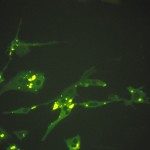Link to Pubmed [PMID] – 25742017
PLoS Negl Trop Dis 2015 Mar;9(3):e0003519
BACKGROUND: There are only few assays available for the detection of Crimean-Congo Hemorrhagic Fever Virus (CCHFV)-specific antibodies in animals, and data about diagnostic sensitivity and specificity are incompletely documented for most of these tests. This is unfortunate since CCHFV antibodies in animals can be used as indicator for virus circulation in a geographic area and therewith potential risk of human exposure. This paper therefore reports on a novel ELISA for the detection of CCHFV-specific antibodies in cattle and on its application for testing ruminant sera from the Former Yugoslav Republic of Macedonia.
PRINCIPAL FINDINGS: A highly sensitive and specific ELISA was developed to detect CCHFV-specific IgG antibodies in cattle. The assay was validated by using 503 negative serum samples from a country where CCHFV has never been detected until now, and by using 54 positive serum samples. The positive sera were verified by using two commercially available assays (for testing human serum) which we have adapted for use in animals. The sensitivity of the novel ELISA was 98% and its specificity 99%. The presence of Hyalomma ticks was demonstrated in the Former Yugoslav Republic of Macedonia and depending on the region antibody prevalence rates up to 80% were detected in the cattle population.
CONCLUSION: This article describes a fully validated, highly sensitive and specific ELISA for the detection of CCHFV-specific IgG antibodies in cattle. Using this assay, CCHFV-specific antibodies were detected for the first time in cattle in the Former Yugoslav Republic of Macedonia, giving evidence for an active circulation of this virus in the country. Supporting this conclusion, the occurrence of the main vector of CCHFV was demonstrated in the present work for the first time in Former Yugoslav Republic of Macedonia.
